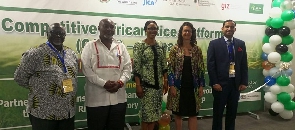 The platform seeks to offer a voice and space for national rice stakeholders in Ghana
The platform seeks to offer a voice and space for national rice stakeholders in Ghana
Ghana’s Competitive African Rice Platform (CARP) has been launched officially in Accra to boost the country’s rice sector. The platform seeks to offer a voice and space for national rice stakeholders in Ghana to scale their local impact on sustainability and competitiveness. Overall, the CARP seeks to reduce the overdependence on imported rice and strengthen public-private dialogue. The platform is supported by the UK’s Foreign, Commonwealth & Development Office (FCDO), AGRA (formerly Alliance for a Green Revolution in Africa), and the Gesellschaft für Internationale Zusammenarbeit (GIZ). Under the initiative, small farmers across West Africa are being supported in boosting their rice harvests, improving product quality, and raising their incomes. Mr. Yaw Adu Poku, Board Chair for CARP Ghana, said: “We are honoured to have been selected to host the CARP, as Ghana’s first national rice chapter, and we see this as a great opportunity to collaborate with the government, international organizations, researchers and farmers to drive a transformation in Ghana’s rice sector.” Following the launch in Accra on Tuesday, a secretariat to run the CARP will be set up to drive its operationalisation. A statement issued by Rebecca Weaver of AGRA explained that at a previous stakeholders meeting, the CARP’s governance structure was formalized, board members and executives appointed, and technical committees set up. Based on field research and recommendations from public and private sector partners across ECOWAS member states, a regional “ECOWAS Rice Observatory” (ERO) had been previously created by the ECOWAS Commission and its partners. The ERO aims to coordinate rice sector-related programs, public/private investments, and policy recommendations for key decision-makers. At the same time, national rice platforms, such as the CARP in Ghana, are being established across West Africa. The platform comprises primarily of private sector stakeholders across the value chain, as well as representation from research, government, and civil society, to coordinate country-specific investments and policies. “Rice is a very important product for Ghana, accounting for nearly 15% of the country’s GDP. The CARP’s launch is, therefore, very timely as it will help different stakeholders to coordinate their investments in driving the transformation needed to boost the growth of the sub-sector for the benefit of local producers and the country at large,” said the Executive Secretary of ERO, Dr. Boladale Adebowale Abiola.
Ghana’s Competitive African Rice Platform (CARP) has been launched officially in Accra to boost the country’s rice sector. The platform seeks to offer a voice and space for national rice stakeholders in Ghana to scale their local impact on sustainability and competitiveness. Overall, the CARP seeks to reduce the overdependence on imported rice and strengthen public-private dialogue. The platform is supported by the UK’s Foreign, Commonwealth & Development Office (FCDO), AGRA (formerly Alliance for a Green Revolution in Africa), and the Gesellschaft für Internationale Zusammenarbeit (GIZ). Under the initiative, small farmers across West Africa are being supported in boosting their rice harvests, improving product quality, and raising their incomes. Mr. Yaw Adu Poku, Board Chair for CARP Ghana, said: “We are honoured to have been selected to host the CARP, as Ghana’s first national rice chapter, and we see this as a great opportunity to collaborate with the government, international organizations, researchers and farmers to drive a transformation in Ghana’s rice sector.” Following the launch in Accra on Tuesday, a secretariat to run the CARP will be set up to drive its operationalisation. A statement issued by Rebecca Weaver of AGRA explained that at a previous stakeholders meeting, the CARP’s governance structure was formalized, board members and executives appointed, and technical committees set up. Based on field research and recommendations from public and private sector partners across ECOWAS member states, a regional “ECOWAS Rice Observatory” (ERO) had been previously created by the ECOWAS Commission and its partners. The ERO aims to coordinate rice sector-related programs, public/private investments, and policy recommendations for key decision-makers. At the same time, national rice platforms, such as the CARP in Ghana, are being established across West Africa. The platform comprises primarily of private sector stakeholders across the value chain, as well as representation from research, government, and civil society, to coordinate country-specific investments and policies. “Rice is a very important product for Ghana, accounting for nearly 15% of the country’s GDP. The CARP’s launch is, therefore, very timely as it will help different stakeholders to coordinate their investments in driving the transformation needed to boost the growth of the sub-sector for the benefit of local producers and the country at large,” said the Executive Secretary of ERO, Dr. Boladale Adebowale Abiola.